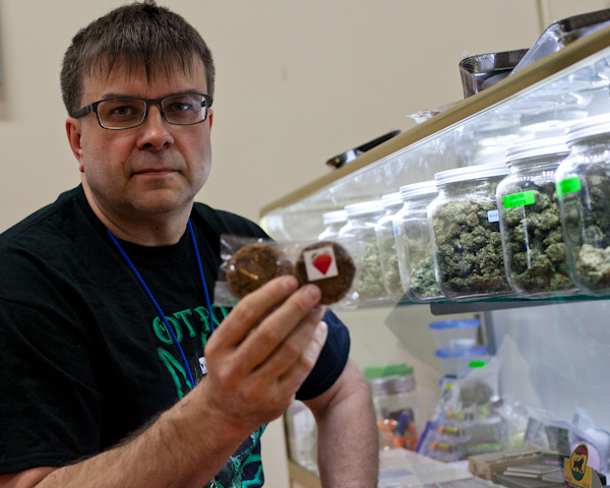The owner of a medical marijuana dispensary says a case that begins in the Supreme Court of Canada today, which could see the legalization of edible marijuana products, is a welcome development for medical pot users.
Chuck Varabioff is the proprietor of the B.C. Pain Society, a Vancouver retail outlet where members can purchase medical marijuana.
Varabioff said the laws that make it illegal to extract THC to drink in tea or eat in baked goods are a detriment to people taking the drug for pain. THC is short for tetrahydrocannabinol, the psychoactive compound in marijuana.
"I have asthma, I don't use the product myself, but Health Canada is telling me the only way I can use it if I need it is to smoke it," he said. "A friend of mine has emphysema, what the hell are they trying to do, kill us?"
It's against the law to sell these edible pot products, but police routinely turn a blind eye, he said.
However, a Victoria man has not been as lucky as Varabioff with authorities. In 2009, Owen Smith was arrested in Victoria, B.C. and charged with possession of THC for the purpose of trafficking after police arrived at his home while he was making edible cannabis products.
Smith has challenged the illegality of edible marijuana products, taking his case for pot-infused baked goods to the Supreme Court.
If Smith wins his case, it will be lawful -- for those who have permission from a doctor -- to munch a pot brownie and wash it down with a cup of marijuana tea.
A ruling in favour of marijuana products could also put in motion regulations that would allow edible marijuana products to be legally sold at dispensaries.
Eases pain
Typically marijuana is baked into goods by extracting the THC by soaking pot leaves in olive oil used in baking. The leaves are then thrown out. Under current laws, however, that oil is now illegal even though the medical marijuana itself was legal for the user to possess.
At the time of his arrest, Smith was making the products for the Cannabis Buyers Club of Canada, a Victoria-based "compassion club" where people living with illness helped by marijuana can get the plant to help ease their pain.
He was acquitted by the B.C. Supreme Court in a decision that also ruled that the right to use medicinal pot applied to edible marijuana products too. The B.C. Court of Appeal upheld that decision.
But the federal government argues against the legality of extracting THC and appealed the case to the Supreme Court.
Kirk Tousaw, the lawyer representing Smith, said treating legitimate medical marijuana users as criminals because they'd rather sip pot in tea and not smoke it in a bong is a violation of their liberty.
"Patients who want to have it for themselves, in any of its forms, are entitled to do so without threat of arrest," Tousaw said. "That's taking patients off the front lines of a war on cannabis plants."
Tousaw said in his previous cases in B.C., one of his witnesses testified that she takes her marijuana by soaking it in water with a tea strainer.
"The government's position at trial was as long as she keeps the strainer in the water and drinks the tea with the dried marijuana... she's not breaking the law," Tousaw said.
"The minute she takes the tea strainer out of the cup, she's now holding and possessing THC, which is not lawful."
Taking marijuana in edible forms can also make the effect last longer, he said.
If the ruling is upheld it will take time to work out the regulations, said Varabioff.
The case marks the first time a medical marijuana case has been heard in the Supreme Court. ![]()
Read more: Health, Rights + Justice















Tyee Commenting Guidelines
Comments that violate guidelines risk being deleted, and violations may result in a temporary or permanent user ban. Maintain the spirit of good conversation to stay in the discussion.
*Please note The Tyee is not a forum for spreading misinformation about COVID-19, denying its existence or minimizing its risk to public health.
Do:
Do not: